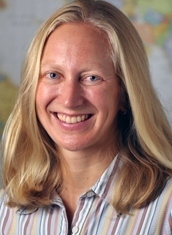
What will become of the young people?
This is the question that has stayed with Catherine Bolten since the end of Sierra Leone’s civil war. The decade-long conflict (1991-2002), in which 50,000 people died, also left in its wake tens of thousands of young people who had been recruited as soldiers for both the rebel and government militias.
Last summer, Bolten, assistant professor of anthropology and peace studies, returned to Sierra Leone with a grant from Notre Dame’s Institute for Scholarship in the Liberal Arts and support from the Ford Family Program in Human Development Studies and Solidarity. Working with Joe Turay, Director of the Fatima Institute in Makeni, she conducted pilot research on how young people are faring in a post-war region marked by deep poverty, scarce food, poor education, no jobs, and high levels of intergenerational tension.
“After the war, there were many champions of the idea that education is the best way to reintegrate ‘war-affected youth,’” Bolten said. “Young ex-combatants and civilians left villages and farms in droves to go to school.” The problem, she said, is that Sierra Leone’s educational system was completely broken, and the promised jobs in government did not materialize.
Now, “there’s a burgeoning population of undereducated, unemployed, and alienated young men — many of whom find they can only gain respect during war with a gun in their hands.”
Sierra Leone was once “the Athens of West Africa,” Bolten said, with universities that produced doctors, lawyers, and other professionals and an agricultural system that allowed the country to feed itself. Today, however, young people with little education feel they are “too developed” to accept menial labor, especially in agriculture.
“They equate education with dignity and reject the practices of their elders,” she says, “while their elders — who still remember well the emboldened youth during the war — actively fear them.”
This intergenerational tension, a sense of betrayal, and smoldering resentment make the situation ripe for repression and potential conflict, Bolten said. Her research project, “Living With Dignity: Youth and Education in Sierra Leone,” is part of a larger effort to study and devise ways to make education and development practices more responsive to the needs of young people in post-conflict settings.
Bolten has been studying the conflict in Sierra Leone since 2003 while she was earning her Ph.D. in anthropology at the University of Michigan. She joined Notre Dame’s Kroc Institute and Department of Anthropology in 2009. She has consulted with the United Nations World Food Programme and Physicians for Social Responsibility and conducted fieldwork on ethnobotany, eco-tourism, and development. Bolten’s articles have appeared in The Journal of Modern African Studies and The Journal of Political Ecology. Her forthcoming book “I Did it to Save My Life: Morality and Survival in Sierra Leone” will be published by the University of California Press in 2012.
Contact: Catherine Bolten, 574-631-5099 or cbolten@nd.edu